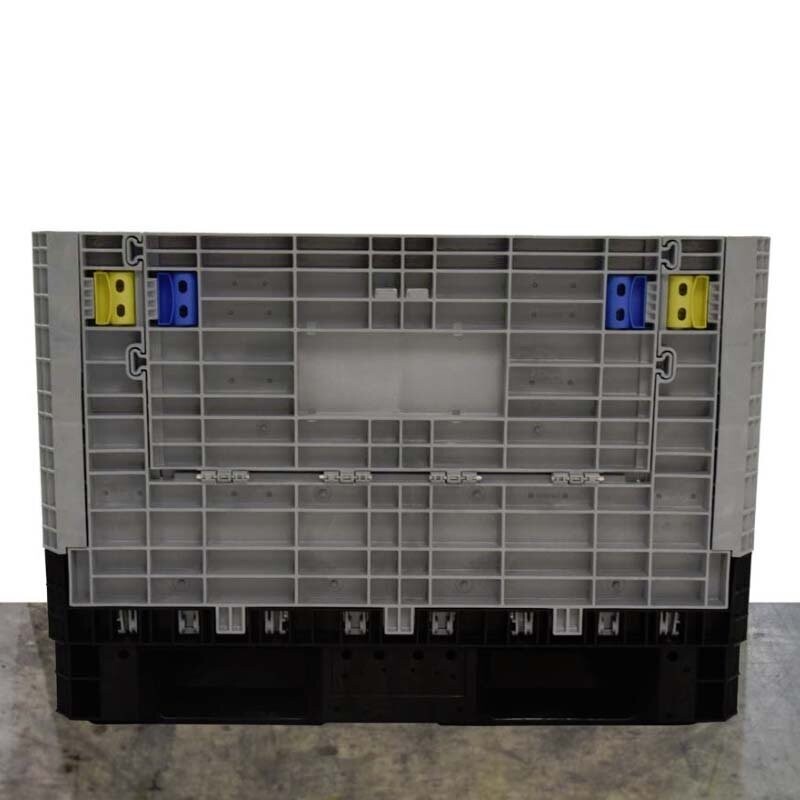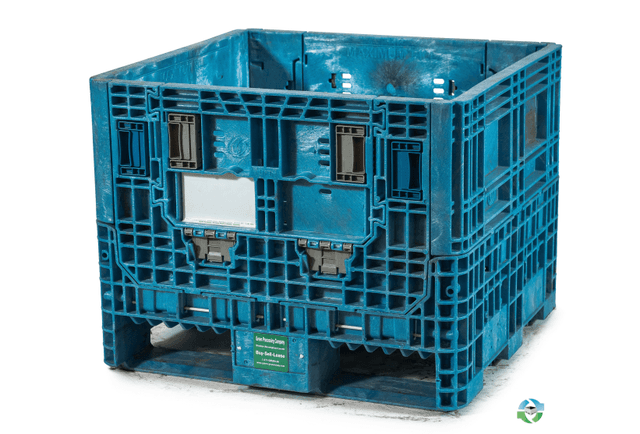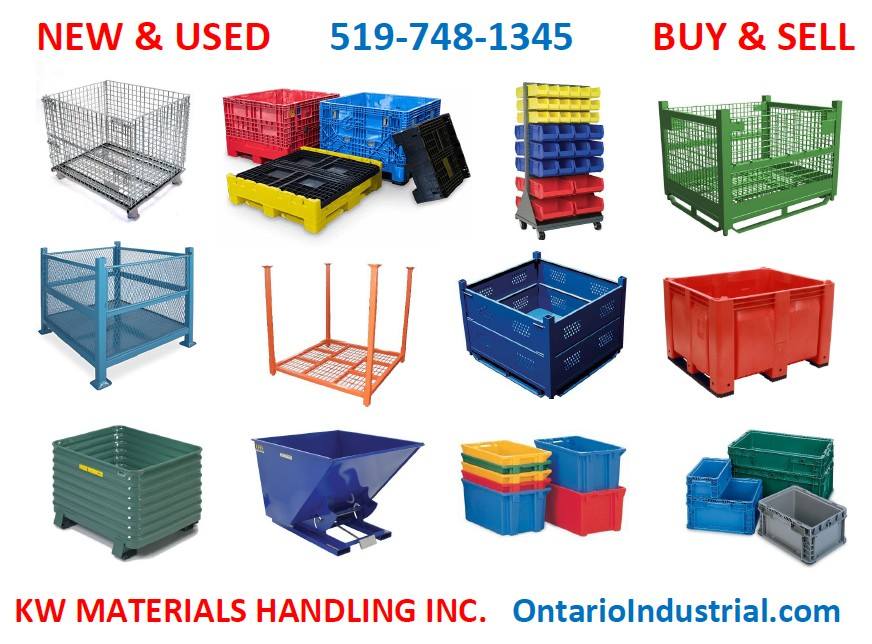Compare refurbished bulk containers and used bulk containers for cost-saving solutions
Wiki Article
Cutting-edge Solutions: Uncovering the Versatility of Bulk Containers in Numerous Industries
Mass containers have arised as a pivotal technology across several markets. Their design enhances storage space and transport efficiency, catering to varied demands while advertising sustainability. Businesses in farming, production, and logistics report substantial enhancements in operational procedures. Nonetheless, the true level of their influence may not yet be fully understood. Discovering the numerous applications and benefits of bulk containers could reveal insights that reshape sector standards. What exists in advance for this advancing solution?Enhancing Agricultural Performance With Bulk Containers
Exactly how can bulk containers change agricultural techniques? In the domain name of agriculture, bulk containers function as a crucial technology, boosting performance and sustainability. They make it possible for farmers to store and transfer huge quantities of grains, fertilizers, and seeds, minimizing the need for several smaller packages that commonly add to throw away. By using bulk containers, farming operations can enhance their supply chains, decreasing taking care of prices and time. These containers are designed for very easy loading and discharging, permitting speedy shifts in between different phases of farming processes.Mass containers promote much better supply administration, guaranteeing that manufacturers have ample materials on hand without excess. This performance converts to lowered labor costs and improved performance. In a field commonly challenged by changing need and seasonal variants, the dependability and scalability offered by mass containers present a significant advantage, equipping farmers to focus on quality and yield.
Simplifying Production Processes Via Bulk Solutions
Bulk options play an important function in simplifying production processes by promoting reliable product handling and giving affordable storage space options. These containers aid preserve an organized manufacturing environment, ultimately enhancing process and efficiency. As sectors increasingly adopt mass services, they are likely to experience substantial enhancements in functional effectiveness.Efficient Product Handling

Effective material handling is vital for optimizing manufacturing processes, as it directly impacts performance and cost-effectiveness. Making use of bulk containers can markedly improve procedures by streamlining the activity and storage of products. Their design permits very easy loading and unloading, reducing the time workers spend taking care of individual products. This effectiveness not just lessens labor expenses but likewise improves workflow, enabling suppliers to react quickly to demand changes. Additionally, mass containers promote far better organization within centers, promoting quick accessibility to products and reducing downtime. By executing these functional services, suppliers can boost overall operational efficiency, ensuring that manufacturing lines run smoothly and effectively while decreasing waste and resource expense. Mass containers play an essential duty in boosting material handling practices.
Cost-efficient Storage Solutions
As makers look for to maximize their procedures, affordable storage remedies come to be progressively crucial. Bulk containers supply a useful ways of storing big amounts of products, reducing the need for multiple smaller storage devices. This debt consolidation causes decrease stock costs, as mass containers often call for less handling and lead to reduced labor costs. In enhancement, their standard dimensions facilitate effective stacking and storage space, maximizing storehouse area. By utilizing bulk containers, manufacturers can reduce waste and improve the total company of their facilities. These containers are also developed for resilience, which can reduce substitute costs over time. In general, integrating bulk containers into storage techniques enables suppliers to improve operations while preserving productivity and effectiveness in their supply chains.
Boosted Production Process
Making use of mass containers considerably enhances manufacturing workflows by streamlining the management of materials throughout the production process. These containers promote efficient storage space and transport, reducing the time invested on taking care of products. Because of this, makers can accomplish quicker turn-around times and reduce hold-ups in manufacturing. Bulk containers also promote much better organization, enabling teams to easily access raw materials when required, which even more improves operations. In addition, the standardized shapes and size of these containers make it possible for optimized use stockroom room, adding to total performance. By integrating mass options into their operations, firms can boost stock control and minimize waste, inevitably resulting in enhanced productivity and a more agile manufacturing setting.Reinventing Food Service Logistics
The food service industry is undergoing substantial change with the fostering of mass containers, improving storage space capabilities and optimizing room utilization. Efficient storage space options enable companies to handle stock extra efficiently, while streamlined transportation processes enhance and decrease costs shipment times. Therefore, these advancements are reshaping logistics and driving higher effectiveness throughout the sector.
Reliable Storage Solutions
Ingenious storage services are transforming food service logistics by enhancing efficiency and enhancing space utilization. Mass containers, made for optimum ability, allow food solution providers to reduce squandered space while preserving simple accessibility to items. These containers can be piled and arranged according to inventory needs, enhancing the storage procedure. Furthermore, their longevity guarantees that food stay protected and risk-free, reducing wasting and losses. With functions such as modular designs and compatibility with different shelving systems, these containers can adapt to varied kitchen layouts. By using effective storage space solutions, food service operations not just improve process yet also enhance overall productivity, ensuring that sources are utilized properly to satisfy client needs.Streamlined Transport Procedures
While many factors add to the performance of food service logistics, structured transportation procedures play an important duty in enhancing supply chain operations. The adoption of mass containers substantially enhances the motion of products, enabling quicker loading and discharging at warehouse. Their standard sizes promote reliable stacking and storage, decreasing squandered area throughout transit. In addition, mass containers decrease the need for too much product packaging, bring about reduce expenses and reduced ecological effect. By making certain that items are safely moved, they mitigate damage and putridity, which is important in the perishable food industry. In general, the combination of bulk containers into transportation strategies not just raises functional effectiveness however also supports sustainable techniques within the food solution industry.The Role of Mass Containers in Pharmaceutical Supply Chains
In the pharmaceutical industry, bulk containers play a vital function in making sure the risk-free and reliable transportation of resources and finished items. These containers are particularly created to satisfy rigid governing demands, supplying perfect defense against contamination and deterioration throughout transportation. Their robust construction enables for the secure transport of sensitive materials, such as energetic pharmaceutical active ingredients (APIs) and intricate formulations, while lessening the danger of damages.Bulk containers help with streamlined handling and storage operations within storehouses and manufacturing facilities. Their standardized sizes make it possible for compatibility with automated systems, boosting efficiency and lowering labor prices. By making use of mass containers, pharmaceutical business can accomplish considerable cost financial savings with mass investing in and reduced packaging waste.
Advertising Sustainability in Product Packaging Practices
The pharmaceutical sector's enhancing dependence on bulk containers has prompted a more comprehensive exam of sustainability in packaging methods throughout different sectors. As firms seek to lower their ecological influence, cutting-edge approaches to product packaging have actually gotten grip. Mass containers, developed for reuse and recycling, present a more functional remedy. Their longevity prolongs product lifecycles, minimizing the need for single-use product packaging.The change in the direction of green coverings and biodegradable products has ended up being essential in the design of these containers. This change not just addresses waste decrease however likewise lines up with customer need for lasting products.
Industries such as food and cosmetics are embracing similar approaches, recognizing that sustainable packaging can enhance brand reputation. Collaborative campaigns in between vendors and producers better advertise sustainability, motivating the development of closed-loop systems - used bulk containers. Eventually, embracing sustainable packaging techniques is important for cultivating a round economy and reducing the ecological footprint throughout diverse sectors
Cost-efficient Transport Solutions With Bulk Containers

Bulk containers streamline dealing with processes, leading to minimized labor costs and minimizing the threat of damage throughout transit - used collapsible bulk containers. Industries such as farming, chemicals, and drugs gain from the longevity and toughness of these containers, which can endure rough conditions while guaranteeing the honesty of their materials
Furthermore, the multiple-use nature of mass containers adds to long-lasting cost savings, as business can depend on fewer, extra sturdy systems instead than often changing single-use product packaging. In this means, mass containers not only improve effectiveness yet likewise sustain general expense management in supply chain operations.
Personalization and Flexibility in Mass Container Layout
While lots of bulk containers are created for common applications, their modification and adaptability have become vital attributes for industries with special requirements. Manufacturers currently supply an array of options, enabling clients to customize containers to certain measurements, products, and functionalities. This versatility allows companies to optimize storage space and transport processes, ensuring compatibility with numerous taking care of systems.As an example, the food and pharmaceutical markets frequently call for containers that fulfill strict hygiene and safety criteria. Customized layouts might include attributes such as tamper-proof seals, easy-to-clean surfaces, and specialized ventilation systems. In the farming field, mass containers can be customized to facilitate the transportation of varied products, from grains to liquids, boosting functional efficiency.
Ultimately, the capability to customize bulk containers not only enhances performance yet also sustains sustainability efforts by lessening waste and optimizing source application across several fields. This flexibility settings bulk containers as functional remedies in today's vibrant market.
Frequently Asked Questions
What Materials Are Bulk Containers Generally Made From?
Bulk containers are normally made from materials such as high-density polyethylene (HDPE), steel, polypropylene, or aluminum. These materials use toughness, resistance to chemicals, and the capability to securely store and deliver numerous products throughout markets.Just How Are Bulk Containers Cleaned Between Uses?
Mass containers are normally cleansed making use of high-pressure cleaning, heavy steam cleansing, or chemical sanitization methods (used plastic containers). The cleaning procedure warranties that residues are eliminated, stopping contamination and keeping the high quality of components for succeeding usages
Can Bulk Containers Be Reused Multiple Times?
Yes, bulk containers can be recycled numerous times. Their durable design enables duplicated use across different applications, provided they are correctly cleaned and maintained after each usage to guarantee safety and hygiene criteria.What Are the Weight Limits for Mass Containers?
Weight limits for bulk containers normally range from 1,000 to 3,000 pounds, depending upon the product and layout. Specifications might vary by manufacturer, so it is critical to speak with pop over here guidelines for particular container kinds.Are There Common Sizes for Bulk Containers?
Yes, there are standard dimensions for bulk containers, usually varying from 20 to 40 cubic feet. These dimensions assist in efficient storage space and transport throughout numerous industries, ensuring compatibility read review with equipment and enhancing space usage.Making use of bulk containers can considerably streamline operations by simplifying the movement and storage space of materials. In enhancement, mass containers promote much better company within centers, assisting in quick access to materials and lowering downtime. Mass containers provide a useful ways of storing huge quantities of products, reducing the requirement for several smaller storage devices. The food service sector is undertaking substantial transformation via the fostering of bulk containers, improving storage capabilities and maximizing area use. Bulk containers promote streamlined handling and storage space procedures within stockrooms and production centers.
Report this wiki page